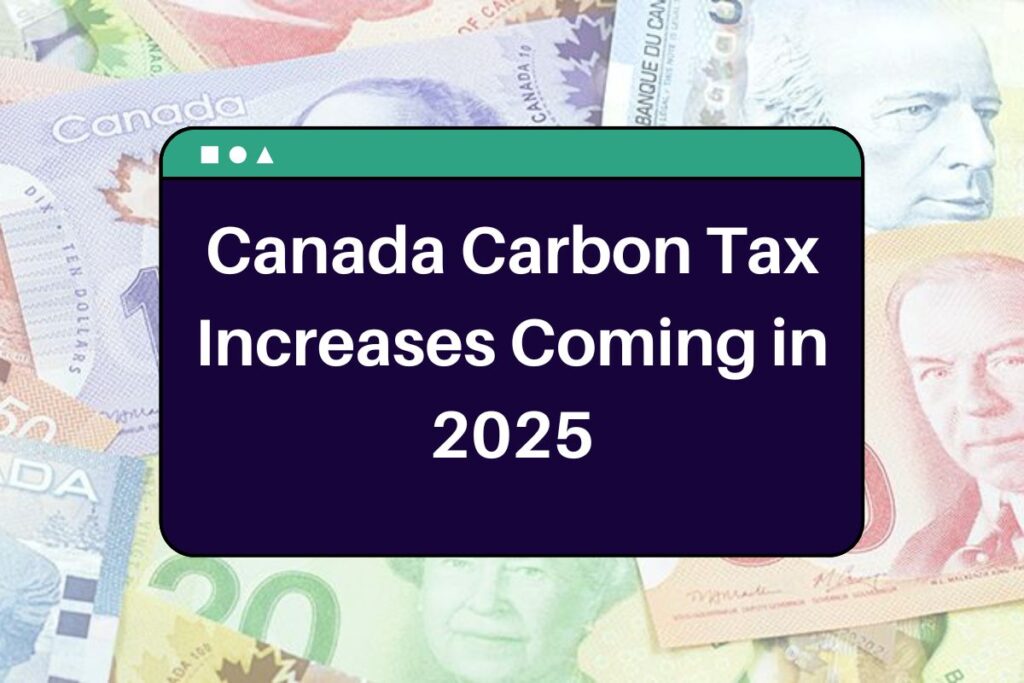As per latest update, Canada Carbon Tax Increases Coming in 2025. Every Canadian pays a federal carbon tax on the natural gas they consume. The Canadian government’s pledge to cut carbon emissions will continue to affect taxpayers. The carbon tax aims to transition to more ecologically friendly energy sources and decrease the use of fossil fuels.
Additionally, the federal government offers a yearly refund to somewhat defray the cost of the carbon tax. Drivers had to pay an additional 3.3 cents per litre at the pump when the price of carbon rose from $65 per tonne to $80 per tonne in April of last year. Based on federal government plans, the carbon tax is expected to rise by an additional 15 percent annually until it hits $170 per tonne in 2030.
Canada Carbon Tax Increases
In 2025, the federal carbon tax rate will have risen from CAD 65 per tonne of carbon emissions to CAD 80 per tonne. The price of products like petrol that significantly depend on carbon emissions will go up as a result of this increase.
- Gasoline: The tax on gasoline will rise to 20.91 cents per liter from 17.61 cents.
- Diesel: The tax rate will rise to 25.40 cents per liter from 21.39 cents.
- Natural gas: The price of carbon will go up to roughly 18 cents per cubic meter.
For the 2025–2026 period, the average household can anticipate paying between $133 and $477 in carbon taxes, even with the refund.
How much you use and the many things you receive determine how much tax you pay. Additionally, you must pay a carbon tax on the natural gas that your house uses. The amount of tax you paid can be found on your monthly home energy bill. The good news is that the federal government gives a carbon tax refund to the majority of Canadians every quarter. It is a fixed amount that you receive in return for all of your carbon tax payments.
What is Canada Carbon Rebate?
Eligible citizens who reside in provinces where the federal carbon pricing scheme is in effect get quarterly payments from the Canada Carbon Rebate, a government program. The rebate assists households in managing rising energy expenses and is fully financed by carbon tax revenues. So here a family of 4 will get up to CAD 1,800 via CCR and the citizens of these regions will receive the first of 4 quarterly CCR payments in April 2025, with further payments to follow in April 2025.
The changes for earlier years’ earnings in Alberta, Saskatchewan, Manitoba, and Ontario are included in Canada Carbon Rebate Amounts 2025. Rural Canadians would receive a 29% top-up to the base Canada Carbon Rebate beginning in 2025, in understanding of their greater energy requirements to clear transportation choices.

The price effect of the consumer carbon tax
A one-time drop in consumer costs, primarily due to a drop in petrol prices, will occur when the consumer carbon tax is repealed, temporarily lowering inflation. 2019 saw the implementation of the federal fuel charge rate, also referred to as the consumer carbon tax. Up until 2024, subsequent yearly increases created a slight upward pressure on inflation. The federal government has lowered inflation for a single year on April 1, 2025, when it sets the rate to zero.
Since its implementation, the carbon tax has raised consumer costs by 0.1% to 0.15 percent annually. This results in a roughly 0.7% overall rise in the price level. By eliminating the carbon tax, this cumulative effect will be reversed, resulting in a 0.7% drop in the consumer price index between April 2025 and March 2026. In other words, for one year, year-over-year inflation will be 0.7 percentage points lower.
The primary cause of this short-term drop in inflation will be decreasing petrol costs. It is expected that the carbon tax increased petrol prices by about 18 cents per litre. Beginning in April 2026, the removal of the consumer carbon price will no longer impact inflation year over year. Under both prospective scenarios, its removal has the same impact because it has nothing to do with the trade dispute.
How to minimize the impact of carbon tax
In 2025, the Canada Carbon Tax will rise as the federal carbon tax will have risen from $65 per tonne of carbon emissions to $80 per tonne. Through the tax, the government hopes to incentivize companies and individuals to embrace more environmentally friendly practices. The federal government is promoting the regular labelling of the direct deposit of the Canada Carbon Rebate that Canadians receive in their bank accounts every three months.
Choose energy-efficient appliances, switch to electric cars, or make investments in renewable energy sources to lessen the effects of the carbon price hike. Emissions should be decreased and businesses should evaluate their carbon footprint.
Started in April 2025, the federal carbon tax will increase to roughly 21 cents/l of gasoline, 25 cents/l of diesel, and 18 cents per cubic meter of natural gas. A carbon tax on carbon emissions from manufacturing goods and services Its goals are to reduce greenhouse gas emissions, create incentives for less carbon-intensive products and services, decrease demand for commodities and services that cause the most emissions, and reveal the hidden societal costs of carbon emissions.
| Official Website | Click Here |
| Homepage | OFSSBihar.in |



